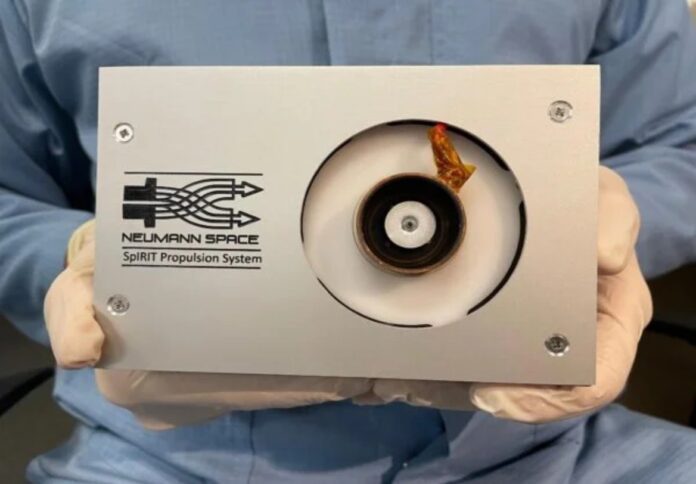
In-space electric propulsion company Neumann Space has completed equipping its propulsion system, called the Neumann Drive, onto Skykraft’s Australian-designed and manufactured satellite.
This is the first time the Neumann Drive, a revolutionary propulsion system that uses solid metallic propellant, has been integrated into a satellite, according to a press release by Neumann.
Final testing of the satellite is now being conducted before it is delivered to the United States for a launch slated for mid-2023.
Herve Astier, CEO of Neumann Space, stated that improved propulsion is becoming more necessary in the rapidly developing space economy.
“Whether it is deorbiting at the end of a mission’s life, navigating into the most effective orbit, or manoeuvring away from growing space junk, we are seeing an increasing demand for our products,” Astier said.
“We look forward to demonstrating in space the sovereign capability that Neumann Space has developed, and the benefits of using a propulsion system that is safer, more efficient and easier to operate,” he said.
Astier added that the sovereign capability that Neumann Space has built and the advantages of employing a propulsion system that is safer, more effective, and simpler to use will be demonstrated in space.
Meanwhile, Dr Michael Frater, CEO of Skykraft, stated that the company was delighted to carry payloads like the Neumann Drive since it would help them establish a crucial space heritage.
“Through this activity, Skykraft supports innovation in the broader Australian space community and has the opportunity to work with our world-leading companies,” the CEO explained.
Headquartered in Adelaide, Australia, Neumann Space designs and manufactures propulsion systems for CubeSats and SmallSats, and it is its CubeSat Product Class that will be carried on the Skykraft satellite.
The company’s patented pulsed cathodic arc thruster technology is used in the propulsion system’s thruster unit, which uses molybdenum as the solid metallic propellant.
Neumann Space said it continues to improve the company’s products, and they have now completed the design and started production of its next-generation Neumann Drive.




















